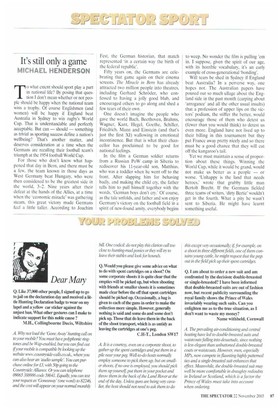It's still only a game
MICHAEL HENDERSON
To what extent should sport play a part in national life? By posing that question I don't mean whether or not people should be happy when the national team wins a trophy. Of course Englishmen (and women) will be happy if England beat Australia in Sydney to win rugby's World Cup. That is understandable and perfectly acceptable. But can — should — something as trivial as sporting success define a nation's wellbeing? That's another matter, and deserves consideration at a time when the Germans are recalling their football team's triumph at the 1954 football World Cup.
For those who don't know what happened that day in Bern, and there must be a few, the team known in those days as West Germany beat Hungary, who were then considered to be the greatest side in the world, 3-2. Nine years after their defeat at the hands of the Allies, at a time when the 'economic miracle' was gathering steam, this great victory made Germans feel a little taller. According to Joachim Fest, the German historian, that match represented In a certain way the birth of the federal republic'.
Fifty years on, the Germans are celebrating that game again on their cinema screens. The Miracle in Bern has already attracted two million people into theatres, including Gerhard Schroder, who confessed to having a jolly good blub, and encouraged others to go along and shed a few tears of their own.
One doesn't imagine the people who gave the world Bach, Beethoven, Brahms, Wagner, Kant, Hegel. Goethe, Schiller, Friedrich, Mann and Einstein (and that's just the first XI) wallowing in emotional incontinence. But that is what their chancellor has proclaimed to be good for national feelings.
In the film a German soldier returns from a Russian PoW camp in Siberia to rediscover his 11-year-old son, Matthias, who was a toddler when he went off to the front. After slapping him for behaving badly, and making the child cry, the father tells him to pull himself together with the words. 'German boys don't cry.' Of course, as the tale unfolds, and father and son enjoy Germany's victory on the football field in a spirit of new-found amity, everybody begins to weep. No wonder the film is pulling 'em in. I suppose, given the spirit of our age, with its horrible vocabulary, it's an early example of cross-generational 'bonding'.
Will tears be shed in Sydney if England beat Australia? In a perverse way, one hopes not. The Australian papers have poured out so much ullage about the England side in the past month (carping about 'arrogance' and all the other usual insults) that a profession of upper lips on the victors' podium, the stiffer the better, would encourage those of them who detest us (fewer than you would think) to detest us even more. England have not lived up to their billing in this tournament but they put France away pretty nicely and so there must be a good chance that they will cut off the kangaroo's tail.
Yet we must maintain a sense of proportion about these things. Winning the World Cup, while it would be grand, would not make us better as a people — or worse. 'Unhappy is the land that needs heroes,' wrote that grubby little man Bertolt Brecht. If the Germans fielded three teams of writers, 'dirty Bertie' wouldn't get in the fourth. What a pity he wasn't sent to Siberia. He might have learnt something useful.


























































































 Previous page
Previous page